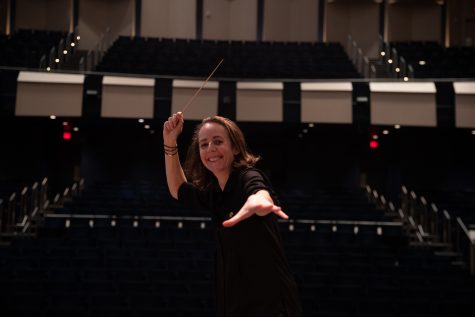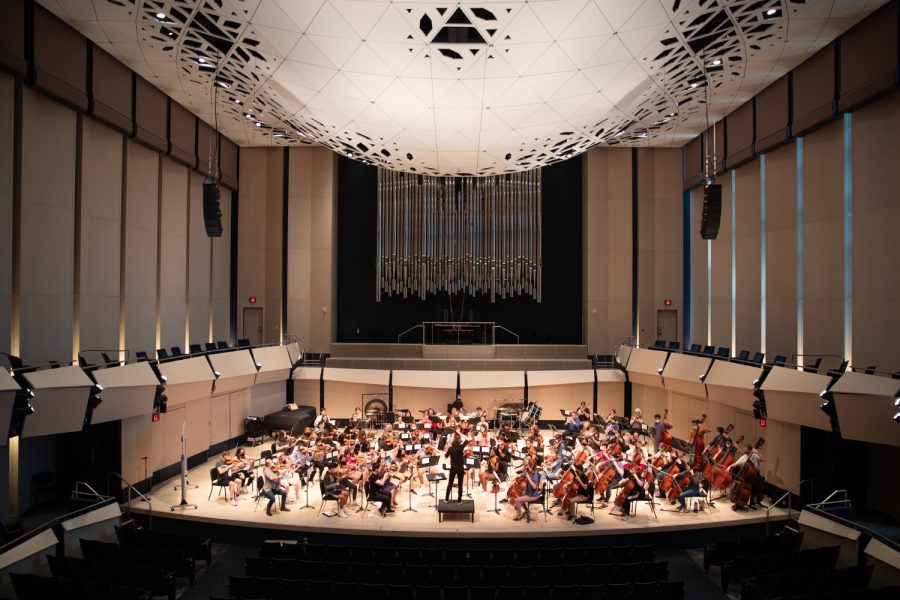UI Symphony Orchestra introduces first female conductor, celebrates 100th anniversary
The orchestra’s Wednesday night concert will kick off a year of musical diversification and honor the symphony’s progress.
University of Iowa Symphony Orchestra conductor Mélisse Brunet leads the symphony orchestra during one of the symphony orchestra’s dress rehearsals on Monday, Sept. 20, 2021. This year, Symphony Orchestra will be celebrating its 100th year.
September 22, 2021
The University of Iowa Symphony Orchestra’s first concert of the season is happening tonight, a celebratory kick-off that will mark its 100th anniversary. What’s more — it will also be led by Paris-born conductor Mélisse Brunet, who will make her debut as the symphony’s first female conductor.
Brunet was hired by the UI last spring as its director of orchestral activities. She said that this year’s anniversary celebrations will honor the symphony’s progress and changes throughout history, all displayed within the symphony’s exciting and eclectic repertoire.
Since she joined the UI’s faculty, Brunet said that she has been pleasantly shocked by UI students’ receptiveness, creativity, and passion to learn.
Brunet said rather than limiting the symphony to a specific musical theme for its 100th year, she believes it is her responsibility as an instructor to broaden students’ experience and exposure to music from different countries and genres.
The concert will start with a piece by composer Joan Towers, “Fanfare for the Uncommon Woman,” a cheeky response to Aaron Copeland’s well-known classical score, “Fanfare for the Common Man.”
Brunet said that to her, the opening piece signifies the change of an era. The piece will mark the first time Voxman audiences will hear the UI Symphony Orchestra play a piece not only composed by a woman, but also conducted by a woman.
“What I want to bring for this 100th season is meaningful pieces for the community, and also changes,”

Brunet said. “So, for example, during our second concert in October, we are performing a piece by a Black composer — a woman, Black composer — which is even harder for them to get their music played, and she’s still alive. So every time, I’m gonna bring new things that have not really been performed yet, as well as repertoire that’s meaningful for the community.”
The final piece of the night will be “Symphony No. 7,” by Antonin Dvorak, a bohemian composer who spent a year living in Spillville, Iowa, where Brunet said he wrote some of his greatest music. She said the Dvorak piece will resonate with the audience because much of his music was inspired by the people and landscape of Iowa.
Brunet’s teaching assistant, Megan Maddaleno, said that in addition to the visible progress the symphony has made in musical skill this year, the orchestra has progressed in inclusivity since its origin in 1921.
“I’ve seen pictures in our library archives of exactly what it was like in the beginning, and I mean, just to compare that to now, it’s just exciting how the orchestra has grown, how it has completely diversified in terms of where people are coming from,” Maddaleno said. “It’s really awesome to see all these people from all around the world come together to make music, in Iowa, of all places.”
Maddaleno also noted that there are now more women occupying the historically male-dominated field. Brunet is Maddaleno’s first female music instructor, and because of that, has offered ideas not previously available to the upcoming professional, including new ways to prepare, practice, interact, and evolve as a musician.
After a year of small ensembles, 20-person orchestras, and playing solo, UI Symphony’s principal viola player Fatima Gassama said coming back together has been a source of hope for the group.
“It just so happens that we had this period where — musicians especially — were unsure about what was to come in the future. And so just to celebrate, I guess sort of this reopening of the symphony concert, and then for it to happen on the 100th year anniversary, I just think that’s such an interesting coincidence,” Gassama said.
For the remainder of the year, the spirit of change and expansion will be a guiding force for the UI Symphony Orchestra. Brunet said it will feel “wonderful” to have an audience.
“The students, when they play that music, they give so many emotions. That’s what has been fascinating for me, is how much I had forgotten how healing it is to play music together,” she said. “But for them, and me to have all of these emotions, you know — symphony is 37 minutes you have the emotion of anger, of sadness, of happiness, of power, of joy. And that allows them to show all of that through the music, and you have no idea, in their eyes, how happy and healing it’s been.”














